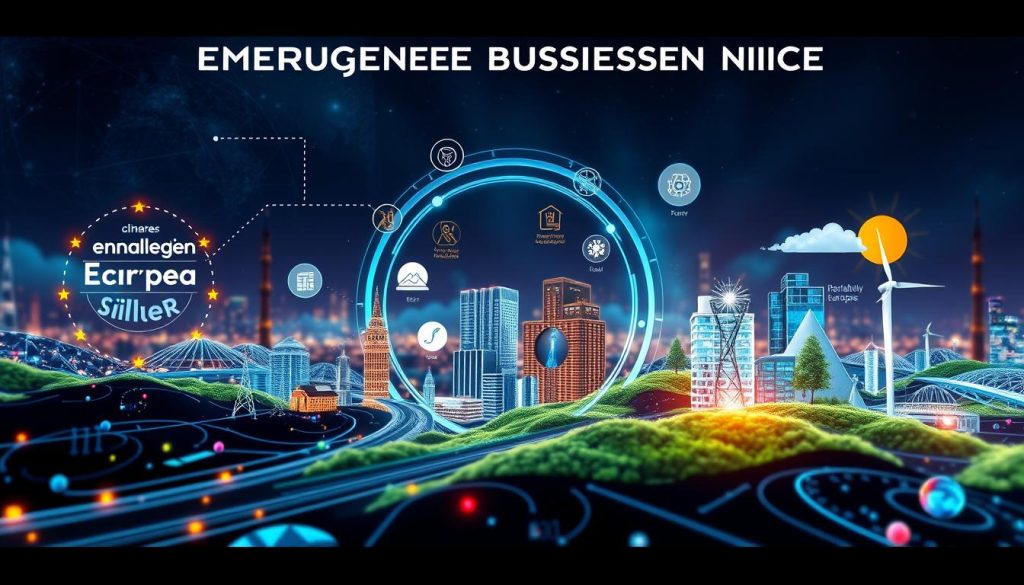Europe’s business landscape is evolving rapidly, creating unprecedented opportunities for entrepreneurs with vision and determination. From the tech hubs of Berlin and Stockholm to the sustainable innovation centers in Amsterdam and Copenhagen, the continent is brimming with potential for new ventures. This comprehensive guide explores the most promising business ideas in Europe for 2026, analyzing current trends, market opportunities, and practical considerations for launching your European business journey.
Whether you’re a seasoned entrepreneur looking to expand into European markets or a first-time business owner seeking profitable opportunities, these 25 innovative business ideas span multiple industries and investment levels. We’ll examine each idea’s market potential, startup requirements, and regulatory considerations to help you identify the perfect match for your entrepreneurial ambitions in Europe’s dynamic business ecosystem.
Current Trends Driving European Entrepreneurship in 2026
Understanding the forces shaping Europe’s business environment is essential for identifying viable business ideas in Europe. Several key trends are currently influencing the entrepreneurial landscape across the continent:
Sustainability and Circular Economy
Europe leads the global push toward sustainability, with the European Green Deal driving significant investment in eco-friendly businesses. Consumers increasingly favor brands with strong environmental credentials, creating opportunities for ventures focused on:
- Circular business models that eliminate waste and pollution
- Carbon-neutral products and services
- Sustainable alternatives to conventional consumer goods
- Renewable energy solutions for homes and businesses
Digital Transformation and AI Integration
The accelerated adoption of digital technologies is transforming traditional industries across Europe. Businesses leveraging artificial intelligence, machine learning, and automation are finding fertile ground for growth, particularly in:
- AI-powered business solutions and productivity tools
- Digital transformation consulting for traditional industries
- Data analytics and business intelligence services
- Automation technologies for manufacturing and logistics
Remote Work and Flexible Business Models
The pandemic-induced shift to remote work has created lasting changes in how Europeans work and do business. This trend has opened opportunities in:
- Remote work enablement tools and platforms
- Flexible workspace solutions and co-working concepts
- Digital nomad services and infrastructure
- Work-life balance consulting and productivity coaching
Health and Wellness Focus
Europeans are increasingly prioritizing health and wellness, creating demand for businesses that support physical and mental wellbeing:
- Personalized health monitoring and management solutions
- Mental health platforms and services
- Fitness technologies and home workout solutions
- Nutrition-focused food services and products
Localization and Community-Centered Commerce
Despite globalization, there’s a growing preference for local products and services that support community economies:
- Hyperlocal delivery and service platforms
- Community-supported agriculture and food production
- Local experience marketplaces and tourism
- Neighborhood-focused retail and service concepts
Technology-Based Business Ideas in Europe
The European tech scene continues to mature, with several countries emerging as global innovation hubs. Here are five promising technology-based business ideas with strong growth potential across European markets:
1. AI-Powered Business Solutions
Target Markets: Germany, France, Netherlands, Nordic countries
Startup Costs: Medium to high (€50,000-€200,000)
Profitability Potential: High, with recurring revenue models
Regulatory Considerations: EU AI Act compliance, GDPR requirements
Develop specialized AI tools that help businesses automate processes, analyze data, or enhance customer experiences. Focus on industry-specific solutions such as AI for legal document analysis in Germany or machine learning for retail inventory management in France. The European AI market is projected to grow at 33.2% annually through 2027, making this one of the most promising business ideas in Europe.
Example: “Retail Intelligence AI” in Berlin – a platform that helps retail stores optimize inventory and staffing based on foot traffic patterns and sales data.
2. Fintech Solutions for SMEs
Target Markets: UK, Ireland, Lithuania, Estonia
Startup Costs: Medium (€30,000-€150,000)
Profitability Potential: High, with subscription-based models
Regulatory Considerations: Financial services licensing, PSD2 compliance
Create financial technology solutions specifically designed for Europe’s small and medium enterprises. Focus on cross-border payment solutions, accounting automation, or alternative lending platforms. The Baltic states offer favorable regulatory environments for fintech startups, while the UK remains Europe’s largest fintech market despite Brexit.
Example: “InvoiceFlow” in Vilnius – a platform that automates invoicing, payment tracking, and cash flow management for small businesses operating across multiple EU countries.
3. Cybersecurity Services
Target Markets: Germany, France, UK, Switzerland
Startup Costs: Low to medium (€15,000-€100,000)
Profitability Potential: High, with growing demand
Regulatory Considerations: NIS2 Directive compliance, industry certifications
Offer specialized cybersecurity services for European businesses facing increasing digital threats. Focus on GDPR compliance solutions, security training, or industry-specific protection services. With cyberattacks increasing by 38% in Europe in 2023, demand for security services continues to grow rapidly.
Example: “MedSecure” in Munich – a cybersecurity service specializing in protecting healthcare providers and medical device manufacturers from data breaches and ransomware.
Ready to Launch Your Tech Business in Europe?
Get our comprehensive guide to navigating Europe’s tech ecosystem, including country-specific regulations, funding opportunities, and market entry strategies.
4. IoT Solutions for Smart Cities
Target Markets: Spain, Denmark, Finland, Netherlands
Startup Costs: Medium to high (€50,000-€250,000)
Profitability Potential: Medium to high, with long sales cycles
Regulatory Considerations: IoT security regulations, public procurement rules
Develop Internet of Things (IoT) solutions that help European cities become smarter and more efficient. Focus on waste management optimization, traffic flow improvement, or energy usage monitoring. Cities like Barcelona, Copenhagen, and Amsterdam are actively investing in smart city technologies.
Example: “WasteTrack” in Barcelona – an IoT system that optimizes waste collection routes and schedules based on real-time bin fill levels, reducing collection costs by up to 30%.
5. EdTech Platforms
Target Markets: France, Germany, Poland, Sweden
Startup Costs: Low to medium (€10,000-€80,000)
Profitability Potential: Medium, with subscription models
Regulatory Considerations: Educational content regulations, GDPR compliance
Create educational technology platforms that address specific learning needs in European markets. Focus on language learning, vocational training, or continuing education for professionals. The European EdTech market is expected to reach €12.5 billion by 2025.
Example: “SkillBridge” in Stockholm – a platform connecting professionals with micro-courses taught by industry experts, focusing on digital skills needed in the Nordic job market.
Sustainable and Green Business Ideas
Europe leads the global sustainability movement, with the EU’s Green Deal creating unprecedented opportunities for eco-friendly businesses. Here are five promising sustainable business ideas with strong market potential:

6. Circular Fashion Enterprises
Target Markets: France, Italy, Denmark, Netherlands
Startup Costs: Low to medium (€5,000-€50,000)
Profitability Potential: Medium, with growing consumer interest
Regulatory Considerations: EU Textile Strategy compliance, sustainability certifications
Launch a fashion business based on circular economy principles, focusing on upcycled materials, clothing rental, or repair services. European consumers increasingly prioritize sustainable fashion, with 73% of Gen Z shoppers willing to pay more for environmentally responsible clothing.
Example: “ReClothe” in Copenhagen – a subscription service allowing customers to rent high-quality, sustainable clothing items with an option to purchase at reduced prices after rental periods.
7. Renewable Energy Consulting
Target Markets: Germany, Spain, Portugal, Poland
Startup Costs: Low (€3,000-€20,000)
Profitability Potential: High, with EU green transition funding
Regulatory Considerations: Energy sector certifications, national renewable incentive programs
Offer specialized consulting services helping businesses and homeowners transition to renewable energy sources. Focus on solar installation planning, energy efficiency audits, or accessing green energy subsidies. With the EU targeting 42.5% renewable energy by 2030, demand for these services continues to grow rapidly.
Example: “SolarTransition” in Lisbon – a consultancy helping small businesses navigate Portugal’s solar incentive programs and implement cost-effective renewable energy solutions.
8. Sustainable Packaging Solutions
Target Markets: Germany, France, Italy, Netherlands
Startup Costs: Medium to high (€30,000-€150,000)
Profitability Potential: High, with regulatory tailwinds
Regulatory Considerations: EU Single-Use Plastics Directive, packaging waste regulations
Develop innovative, biodegradable packaging alternatives for businesses adapting to stricter EU regulations on single-use plastics. Focus on food service packaging, e-commerce shipping materials, or retail packaging solutions. With the EU banning many single-use plastic items, businesses are actively seeking sustainable alternatives.
Example: “BioWrap” in Milan – producing food packaging made from agricultural waste that biodegrades completely within 180 days, targeting Italy’s restaurant and food delivery sectors.
9. Urban Farming Solutions
Target Markets: Netherlands, Belgium, Germany, France
Startup Costs: Medium (€20,000-€100,000)
Profitability Potential: Medium, with premium pricing
Regulatory Considerations: Food safety regulations, urban planning permits
Create vertical farming operations or urban agriculture technologies that produce fresh food in city environments. Focus on high-value crops, subscription harvest models, or technology for home growers. Urban farming addresses growing concerns about food miles and supply chain resilience.
Example: “VerticalHarvest” in Rotterdam – a network of vertical farms producing herbs and microgreens for local restaurants, reducing food miles and delivering ultra-fresh produce.
Launch Your Sustainable Business in Europe
Access our detailed guide to green business opportunities, EU sustainability funding programs, and eco-certification processes.
10. Eco-Tourism Platforms
Target Markets: Portugal, Greece, Croatia, Slovenia
Startup Costs: Low to medium (€5,000-€40,000)
Profitability Potential: Medium, with seasonal fluctuations
Regulatory Considerations: Tourism licensing, protected area access permits
Develop platforms connecting travelers with authentic, sustainable tourism experiences that benefit local communities and minimize environmental impact. Focus on rural tourism, nature experiences, or cultural immersion. Sustainable tourism is growing 3x faster than conventional tourism in Europe.
Example: “LocalEcoStays” in Ljubljana – a platform connecting travelers with certified sustainable accommodations and experiences throughout Slovenia’s natural parks and rural areas.
Health and Wellness Business Opportunities
Europe’s aging population and increasing focus on wellbeing create numerous opportunities in the health sector. Here are five promising health and wellness business ideas with strong growth potential:

11. Digital Mental Health Platforms
Target Markets: UK, Germany, Sweden, Netherlands
Startup Costs: Medium (€20,000-€80,000)
Profitability Potential: High, with subscription models
Regulatory Considerations: Healthcare regulations, therapist licensing, GDPR
Create digital platforms connecting users with mental health professionals or providing evidence-based self-help tools. Focus on workplace mental health, youth support, or specialized therapy areas. With mental health awareness growing across Europe, these services are increasingly in demand.
Example: “MindConnect” in Berlin – a platform offering video therapy sessions, digital CBT courses, and employer mental health programs tailored to German workplace regulations.
12. Senior Care Technology
Target Markets: Italy, Germany, Spain, France
Startup Costs: Medium to high (€30,000-€120,000)
Profitability Potential: High, with Europe’s aging demographics
Regulatory Considerations: Medical device regulations, care quality standards
Develop technologies that help Europe’s growing senior population maintain independence and quality of life. Focus on remote monitoring systems, companionship solutions, or specialized home adaptation services. With adults over 65 projected to represent 30% of Europe’s population by 2050, this market offers long-term growth potential.
Example: “VitaLink” in Milan – a connected home system allowing family members to monitor elderly relatives’ wellbeing through non-intrusive sensors and AI pattern recognition.
13. Personalized Nutrition Services
Target Markets: UK, France, Denmark, Switzerland
Startup Costs: Low to medium (€10,000-€60,000)
Profitability Potential: Medium to high, with premium pricing
Regulatory Considerations: Nutrition claim regulations, health data protection
Offer personalized nutrition plans based on individual health data, genetic information, or dietary preferences. Focus on specialized diets, health condition management, or performance optimization. European consumers increasingly recognize the connection between nutrition and overall health.
Example: “NutriGenome” in Copenhagen – combining DNA testing with nutritionist consultations to create personalized eating plans based on genetic predispositions and health goals.
14. Wellness Tourism Services
Target Markets: Austria, Czech Republic, Hungary, Portugal
Startup Costs: Medium (€15,000-€80,000)
Profitability Potential: Medium, with seasonal variations
Regulatory Considerations: Tourism licensing, health service regulations
Create specialized wellness tourism experiences that leverage Europe’s thermal spas, natural resources, or traditional healing practices. Focus on stress reduction retreats, digital detox programs, or medical tourism facilitation. Wellness tourism is growing at 10% annually in Europe, twice the rate of general tourism.
Example: “AlpineReset” in Austria – organizing personalized wellness retreats combining traditional Alpine spa therapies with modern stress reduction techniques in the Tyrolean mountains.
15. Fitness Technology Solutions
Target Markets: UK, Germany, France, Nordic countries
Startup Costs: Medium (€20,000-€100,000)
Profitability Potential: Medium to high, with subscription models
Regulatory Considerations: Consumer product safety, health claim regulations
Develop innovative fitness technologies that enhance workout experiences or track health metrics. Focus on home fitness solutions, corporate wellness programs, or specialized training technologies. The European fitness technology market is projected to grow at 20% annually through 2026.
Example: “FitTech” in Stockholm – creating AI-powered fitness mirrors that provide personalized workout guidance and form correction for home exercisers.
Food and Beverage Business Ideas
Europe’s rich culinary traditions and evolving food preferences create numerous opportunities in the food and beverage sector. Here are five promising business ideas with strong market potential:

16. Plant-Based Food Production
Target Markets: Germany, UK, Netherlands, Sweden
Startup Costs: Medium to high (€30,000-€200,000)
Profitability Potential: High, with growing market demand
Regulatory Considerations: Food safety regulations, labeling requirements
Develop innovative plant-based alternatives to meat, dairy, or other animal products. Focus on locally-sourced ingredients, traditional European flavors, or specialized products like plant-based versions of regional specialties. The European plant-based food market is growing at 10-15% annually.
Example: “PlantAlp” in Switzerland – producing plant-based alternatives to traditional Alpine cheese varieties using local ingredients and traditional aging techniques.
17. Craft Beverage Production
Target Markets: Belgium, UK, Italy, Czech Republic
Startup Costs: Medium to high (€50,000-€250,000)
Profitability Potential: Medium, with premium pricing
Regulatory Considerations: Alcohol production licensing, excise taxes
Create craft beverages that reflect local traditions or innovative new approaches. Focus on non-alcoholic craft options, regional specialties, or beverages with functional benefits. European consumers increasingly favor craft and artisanal beverages over mass-produced alternatives.
Example: “BrewRevive” in Prague – producing craft non-alcoholic beers using traditional Czech brewing methods but removing alcohol through innovative vacuum distillation.
Start Your Food Business in Europe
Download our comprehensive guide to European food regulations, market opportunities, and distribution strategies for culinary entrepreneurs.
18. Personalized Meal Delivery
Target Markets: France, Germany, UK, Spain
Startup Costs: Medium (€20,000-€100,000)
Profitability Potential: Medium to high, with subscription models
Regulatory Considerations: Food safety, delivery regulations, packaging laws
Offer personalized meal delivery services catering to specific dietary needs, health goals, or culinary preferences. Focus on locally-sourced ingredients, specialized diets, or gourmet experiences at home. The European meal delivery market continues to grow even post-pandemic.
Example: “MediterraneanBox” in Barcelona – delivering personalized meal kits featuring fresh Mediterranean ingredients with recipes tailored to customers’ health goals and taste preferences.
19. Food Waste Reduction Solutions
Target Markets: France, Italy, Netherlands, Denmark
Startup Costs: Low to medium (€5,000-€50,000)
Profitability Potential: Medium, with social impact benefits
Regulatory Considerations: Food safety regulations, waste management laws
Create businesses that address Europe’s growing concern with food waste. Focus on surplus food marketplaces, upcycled food products, or technologies that extend food freshness. With EU targets to reduce food waste 50% by 2030, this sector has strong regulatory support.
Example: “SavedFruits” in Paris – transforming imperfect or surplus fruits into premium preserves and juices, working directly with local farmers to reduce agricultural waste.
20. Culinary Tourism Experiences
Target Markets: Italy, Spain, France, Greece
Startup Costs: Low to medium (€5,000-€40,000)
Profitability Potential: Medium, with seasonal variations
Regulatory Considerations: Tourism licensing, food handling permits
Develop unique culinary tourism experiences that showcase regional food traditions and connect visitors with local producers. Focus on cooking classes, food trails, or producer visits. Food is a primary motivation for 30% of European travelers when choosing destinations.
Example: “TasteTrails” in Sicily – organizing guided multi-day tours of Sicilian food producers, with hands-on cooking classes and meals in family homes rather than restaurants.
Service-Based Business Ideas
Service businesses often require lower initial investment while offering significant growth potential. Here are five promising service-based business ideas for the European market:

21. Remote Work Consultancy
Target Markets: Germany, UK, Netherlands, Nordic countries
Startup Costs: Low (€2,000-€15,000)
Profitability Potential: Medium to high, with growing demand
Regulatory Considerations: Business consulting regulations, employment law knowledge
Offer specialized consulting services helping European businesses optimize their remote work policies, tools, and practices. Focus on hybrid work models, international remote hiring, or workplace technology integration. With 40% of European workers now working remotely at least part-time, businesses need expert guidance.
Example: “RemoteWorks” in Amsterdam – helping Dutch companies implement effective hybrid work models while navigating complex EU cross-border employment regulations.
22. Sustainability Consulting
Target Markets: Germany, France, Nordic countries, Netherlands
Startup Costs: Low (€3,000-€20,000)
Profitability Potential: High, with regulatory tailwinds
Regulatory Considerations: Environmental certification knowledge, industry standards
Provide consulting services helping businesses meet sustainability goals and comply with increasingly strict environmental regulations. Focus on carbon footprint reduction, ESG reporting, or circular economy implementation. With the EU’s Corporate Sustainability Reporting Directive affecting 50,000 companies, demand for these services is surging.
Example: “GreenTransform” in Helsinki – specializing in helping manufacturing businesses implement circular economy principles and achieve carbon neutrality.
23. Digital Marketing for Local Businesses
Target Markets: Italy, Spain, Poland, Czech Republic
Startup Costs: Low (€1,000-€10,000)
Profitability Potential: Medium to high, with recurring revenue
Regulatory Considerations: Digital marketing regulations, GDPR compliance
Offer specialized digital marketing services for small and medium businesses in European markets with lower digital adoption rates. Focus on local SEO, social media management, or e-commerce enablement. Many European SMEs still lack effective digital marketing strategies.
Example: “LocalDigital” in Warsaw – helping traditional Polish businesses develop effective online presences with localized SEO and social media strategies tailored to regional consumer behaviors.
Launch Your Service Business in Europe
Get our detailed guide to starting and scaling a service-based business in Europe, including market analysis, pricing strategies, and growth tactics.
24. Language Services for Businesses
Target Markets: Germany, France, Spain, Eastern Europe
Startup Costs: Low (€1,000-€8,000)
Profitability Potential: Medium, with specialized niches
Regulatory Considerations: Translation certification requirements, data protection
Provide specialized language services for businesses operating across Europe’s multilingual markets. Focus on technical translations, localization services, or industry-specific interpretation. Despite English being widely spoken, businesses still need professional translation for legal compliance and effective marketing.
Example: “MedTranslate” in Barcelona – specializing in medical and pharmaceutical translations across European languages, with certified translators for regulatory documentation.
25. Virtual Assistant Services
Target Markets: UK, Germany, Switzerland, Luxembourg
Startup Costs: Low (€500-€5,000)
Profitability Potential: Medium, with scalable model
Regulatory Considerations: Data protection, independent contractor regulations
Offer virtual assistant services to European professionals and small businesses. Focus on industry-specific support, multilingual capabilities, or specialized administrative tasks. The European VA market is less saturated than in the US, offering growth opportunities.
Example: “EuroAssist” in Lisbon – providing multilingual virtual assistant services to financial professionals across Europe, with expertise in financial terminology and compliance requirements.
Emerging Niches and Future Opportunities
Beyond the established business ideas, several emerging niches show exceptional promise for entrepreneurs looking to enter European markets. These areas represent the cutting edge of innovation and changing consumer preferences:

Circular Economy Startups
Businesses focused on extending product lifecycles, eliminating waste, and creating closed-loop systems are gaining significant traction. Opportunities exist in:
- Product-as-a-service models that replace ownership with usage rights
- Repair and refurbishment services for electronics, furniture, and appliances
- Materials marketplaces connecting waste producers with businesses that can use those materials
- Packaging return and reuse systems that eliminate single-use containers
Silver Economy Ventures
With Europe’s rapidly aging population, businesses serving older adults represent a massive growth opportunity. Promising areas include:
- Aging-in-place technologies that help seniors remain independent
- Specialized travel and leisure experiences designed for older adults
- Financial services addressing retirement planning and wealth transfer
- Intergenerational housing concepts and community models
Climate Tech Solutions
As Europe accelerates its transition to a low-carbon economy, climate technology businesses are attracting significant investment. Opportunities include:
- Carbon capture and utilization technologies
- Climate risk assessment tools for businesses and governments
- Energy efficiency solutions for buildings and industrial processes
- Climate-resilient agriculture technologies and services
Digital Health Innovations
The intersection of healthcare and technology continues to produce valuable business opportunities, particularly in:
- Remote patient monitoring systems for chronic disease management
- Mental health platforms addressing Europe’s growing psychological wellbeing concerns
- AI-powered diagnostic tools and decision support systems
- Digital therapeutics offering evidence-based interventions via mobile applications
Personalization Technologies
Consumers increasingly expect personalized products and experiences, creating opportunities in:
- Mass customization platforms for consumer products
- Personalized nutrition and wellness recommendations based on individual data
- Custom learning experiences adapted to individual learning styles
- Tailored travel and experience curation services
Overcoming Challenges in European Business
While Europe offers tremendous opportunities for entrepreneurs, several common challenges must be addressed for business success. Understanding these obstacles and developing strategies to overcome them is essential for any new venture in European markets.

European Business Advantages
- Access to a market of 450+ million consumers
- Strong infrastructure and digital connectivity
- Highly educated workforce
- Robust legal frameworks and intellectual property protection
- Numerous government support programs for innovation
- Strong sustainability focus creating new opportunities
European Business Challenges
- Complex regulatory environment varying by country
- High taxation in many markets
- Cultural and language differences across markets
- Strong local competition in established sectors
- Slower decision-making processes in some regions
- Varying levels of digital adoption across countries
Navigating Regulatory Complexity
Europe’s regulatory environment can be challenging, with EU-wide regulations overlapping with country-specific requirements. To overcome this challenge:
- Work with local legal experts familiar with both EU and national regulations
- Consider starting in countries with more streamlined regulatory processes (Estonia, Ireland, Netherlands)
- Utilize resources from European Enterprise Network and local chambers of commerce
- Build compliance into your business model from the beginning rather than as an afterthought
Securing Funding and Financial Support
While Europe’s venture capital ecosystem has matured, funding can still be more conservative than in the US. Strategies for success include:
- Explore EU funding programs like Horizon Europe and the European Innovation Council
- Consider alternative funding sources like crowdfunding, which is well-established in Europe
- Research country-specific grants and incentives for your business type
- Build relationships with European investors who understand local markets
- Demonstrate clear path to profitability, which European investors often prioritize
Addressing Cultural Differences
Europe’s cultural diversity creates both opportunities and challenges for new businesses. To navigate these differences effectively:
- Adapt your marketing and communication strategies to local preferences
- Understand regional business etiquette and negotiation styles
- Consider partnering with locals who understand the market nuances
- Recognize that building trust takes time in many European business cultures
- Invest in professional translation and localization for all customer-facing materials
Navigate European Business Challenges Successfully
Download our comprehensive guide to overcoming the most common obstacles when starting a business in Europe, with country-specific insights and expert recommendations.
Managing Competition
Many European markets feature strong local competitors with established customer relationships. To compete effectively:
- Identify specific gaps in existing offerings that your business can address
- Emphasize your unique value proposition and differentiators
- Consider entering through less competitive secondary markets before targeting major cities
- Build strategic partnerships with complementary local businesses
- Invest in understanding customer needs that aren’t being fully met by existing options
Scaling Across Borders
Expanding beyond your initial European market presents unique challenges. For successful cross-border growth:
- Develop a phased expansion plan targeting markets with similar characteristics first
- Understand VAT implications and establish appropriate tax structures
- Build a multilingual team that can support customers across different markets
- Adapt your offering to meet local preferences while maintaining core brand identity
- Consider establishing an EU headquarters in a business-friendly location like Ireland, Netherlands, or Estonia
Conclusion: Your Path to European Business Success
Europe’s diverse markets, innovative ecosystems, and supportive business environments create fertile ground for entrepreneurs with vision and determination. The 25 business ideas presented in this guide represent some of the most promising opportunities across the continent, spanning multiple industries and investment levels.

As you consider which business ideas in Europe might be right for you, remember that success often comes from aligning opportunity with passion and expertise. The most successful European entrepreneurs typically combine:
- Deep understanding of local market needs and cultural nuances
- Innovative approaches to solving real problems
- Commitment to sustainability and social responsibility
- Adaptability to navigate Europe’s evolving regulatory landscape
- Persistence in overcoming the inevitable challenges of entrepreneurship
Whether you’re drawn to technology, sustainability, health and wellness, food and beverage, or service-based opportunities, Europe offers a wealth of possibilities for building a successful business. By carefully researching your target markets, understanding regulatory requirements, and developing a compelling value proposition, you can join the ranks of successful entrepreneurs contributing to Europe’s dynamic business ecosystem.
The journey of entrepreneurship is never easy, but with the right idea, preparation, and execution, building a thriving business in Europe is within reach. We hope this guide has inspired you to explore the possibilities and take the first steps toward turning your European business vision into reality.
Ready to Start Your European Business Journey?
Download our comprehensive European Market Entry Guide with detailed information on all 25 business ideas, regulatory considerations, and country-specific insights.
















